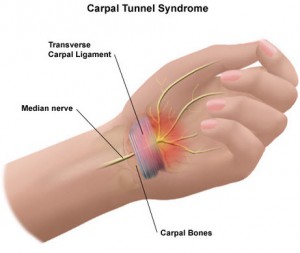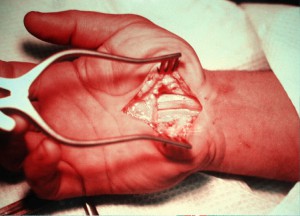Shoulder pain has a way of creeping into nearly every part of daily life. Simple movements — like reaching into a cabinet, fastening a seatbelt, getting dressed, or even finding a comfortable sleeping position — can suddenly become frustrating or downright painful....
Sleep plays a vital role in healing, recovery, and overall well-being. Unfortunately, hip pain can make getting a full night’s rest feel nearly impossible. Tossing and turning to find a comfortable position, waking up from sharp or aching pain, or starting the morning...
If you are struggling with lower back pain that radiates down your leg, you might have hit the internet searching for answers, only to find the terms “sciatica” and “herniated disc” discussed frequently. This is because both conditions can cause debilitating back...
Combating Carpal Tunnel Syndrome at the Office

Sitting down for around eight hours per day, five days a week isn’t that good for us, and yet that’s what the average office worker does. Factor in the fact that the vast majority of that time is spent working on a computer, and the risk of musculoskeletal problems increases, especially as “how to sit down safely” isn’t helped by the average work station. Ideally, Mr. or Ms. Average Office Worker would then go home and do something completely unrelated, but there’s a good chance they’ll sit down at a computer or games console at home, still carrying out repetitive hand movements, and probably at a considerably less ergonomically designed desk than their workspace.
What is carpal tunnel syndrome?
Human beings are poorly-designed in the hand and wrist area, and carpal tunnel syndrome is caused by compression of the median nerve, which controls movement and sensation in the hand and wrist. It can be inherited, and can appear during pregnancy, but can also be caused by repetitive movement in the hands and fingers, such as long bouts of typing, gaming, texting, and even craft activities like embroidery and cross-stitch. Symptoms include (but are not limited to) numbness in the fingertips (the little finger is usually unaffected), thumb weakness, and pain not just in the hand and fingers, but often in the arm and even up to the shoulder joint. Symptoms are frequently much worse at night, so sufferers can also end up sleep-deprived.
How is it treated?
The first treatment options are often splints to be worn at night to immobilize the wrist joint, and, if the patient is overweight, a diuretic to reduce any fluid compression on the carpal tunnel itself. In mid to severe cases, steroid injections or carpal tunnel release surgery may be carried out.
How can it be prevented?
As with all medical conditions, prevention is far better than cure:
- Set up office and home workspaces carefully – use wrist rests, and use split keyboards and a side-slanted/vertical mouse, both designed for use by RSI and carpal tunnel sufferers to reduce and relieve symptoms.
- Limit repetitive activity – screen breaks for the eyes should also be hand breaks for the wrists! Spending break periods texting or gaming will only exacerbate any underlying problems.
- Exercises – stretch arms out in front and with locked elbows, hold hands up as though to stop traffic for a few seconds, relax hands and fingers, make a fist with wrists bent.
- Take the lazy way – use voice recognition software where possible when typing, and instead of texting or using repetitive hand movements on phones and tablets, use the voice activated knowledge software.
- Numbness and tingling can be alleviated by hanging hands straight down by the sides and wriggling fingers.
- The Alexander technique and other posture-retraining therapies can help poor upper body alignment, and reduce the risk of carpal tunnel developing or getting worse.
Carpal tunnel symptoms should never be ignored; they can often be an indicator of another underlying condition which may require medical investigation and treatment in its own right. Even if carpal tunnel is just carpal tunnel, leaving symptoms unchecked and untreated can lead to very weak hands and extreme pain.


